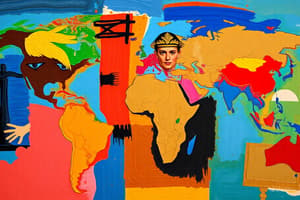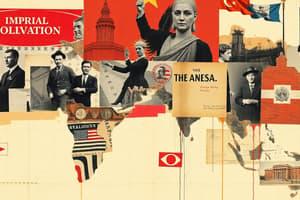Podcast
Questions and Answers
இத்தாலியத்தின் உயர்ந்த அதிகாரத்தின் பயன்படுத்தல்கள் என்ன?
இத்தாலியத்தின் உயர்ந்த அதிகாரத்தின் பயன்படுத்தல்கள் என்ன?
உலகத்தில் உள்ளிடம் பெருமளவு விளைவுகள் உண்டு
காலையில் உள்ள வளர்ச்சி நாடுகள் எத்தனை வழக்கங்களை எடுத்துக்காட்டுகிறது?
காலையில் உள்ள வளர்ச்சி நாடுகள் எத்தனை வழக்கங்களை எடுத்துக்காட்டுகிறது?
பல வளர்ச்சி நாடுகள் பெருமிதமாக உள்ளிடம் பெருமளவு வழக்கங்களை அனுபவிக்கின்றன
கடைசியாக, காலாவதியின் வரலாறு என்ன?
கடைசியாக, காலாவதியின் வரலாறு என்ன?
காலாவதி அதிகாரம் மற்றும் இதிகாரம் இன்றைய உலகத்தை உள்ளிட்டுள்ளது.
காலையில் உள்ளிடம் பெருமளவு விளைவுகளை உண்டாக்கினைகள் என்ன?
காலையில் உள்ளிடம் பெருமளவு விளைவுகளை உண்டாக்கினைகள் என்ன?
கொள்ளையம் என்றால் என்ன?
கொள்ளையம் என்றால் என்ன?
கொள்ளை சக்தியம் என்றால் என்ன?
கொள்ளை சக்தியம் என்றால் என்ன?
கொள்ளையம் முக்கியமாக என்னுடைய வரலாறு அமைந்துவிட்டது?
கொள்ளையம் முக்கியமாக என்னுடைய வரலாறு அமைந்துவிட்டது?
கொள்ளையம் மற்றும் கொள்ளை சக்தியம் என்ன?
கொள்ளையம் மற்றும் கொள்ளை சக்தியம் என்ன?
கொள்ளையளவுப் போதும், கொள்ளையளவு என்பது என்ன?
கொள்ளையளவுப் போதும், கொள்ளையளவு என்பது என்ன?
கொள்ளையளவுப் போதும், உயர்ச்சி பெறுவதற்கான முக்கிய பகுப்புகள் எந்தவை?
கொள்ளையளவுப் போதும், உயர்ச்சி பெறுவதற்கான முக்கிய பகுப்புகள் எந்தவை?
கொள்ளையளவுப் போதும், வளர்ச்சி பெறுவதற்கான முக்கிய பகுப்புகள் எந்தவை?
கொள்ளையளவுப் போதும், வளர்ச்சி பெறுவதற்கான முக்கிய பகுப்புகள் எந்தவை?
கொள்ளையளவுப் போதும், இயக்கச் சார்ந்த விதிகள் எவை?
கொள்ளையளவுப் போதும், இயக்கச் சார்ந்த விதிகள் எவை?
கொள்ளையளவுப் போதும், அறிவோம் எந்தவை?
கொள்ளையளவுப் போதும், அறிவோம் எந்தவை?
ஐக்கிய முல்கங்கள் போதும், கடல்கரைகள் எந்த விதியாக பரவலாக்கப்படலாம்?
ஐக்கிய முல்கங்கள் போதும், கடல்கரைகள் எந்த விதியாக பரவலாக்கப்படலாம்?
Flashcards are hidden until you start studying
Study Notes
Introduction
History is a fascinating field of study that explores the past, including the rise and fall of empires, the evolution of societies, and the development of civilizations. Two significant aspects of history are colonialism and imperialism, which have shaped the world as we know it today. In this article, we will delve into the history of colonialism and imperialism, exploring their causes, consequences, and the impact they have had on various regions around the world.
Colonialism
Colonialism refers to the practice of establishing and maintaining control over other regions or territories, typically through the use of military force or political and economic domination. Colonial powers, such as Britain, France, and Spain, established colonies around the world, often claiming new territories as their own or taking control of existing ones.
Some key aspects of colonialism include:
- Expansion of empires: Colonial powers sought to expand their territories and resources, often invading and establishing control over foreign lands.
- Economic exploitation: Colonial powers extracted resources from their colonies, often through forced labor or exploitative trade agreements.
- Cultural imposition: Colonial powers imposed their own languages, religions, and customs on the people they colonized, sometimes erasing existing cultures and traditions.
Colonialism had a profound impact on the world, with some of its effects still being felt today. For example, many countries that were once colonies have experienced ongoing struggles with poverty, underdevelopment, and political instability.
Imperialism
Imperialism is a similar concept to colonialism, but it often refers to the more subtle forms of control and domination that exist between nations. While colonialism involved direct territorial control, imperialism can involve economic, political, or cultural influence.
Some key aspects of imperialism include:
- Economic domination: Imperial powers sought to control the economies of other nations, often through the use of trade agreements, loans, or other forms of economic coercion.
- Political influence: Imperial powers exerted political influence over other nations, often through the use of diplomacy, alliances, or military intervention.
- Cultural hegemony: Imperial powers sought to impose their own values, beliefs, and cultural practices on other nations, often through the media, education, or other forms of soft power.
Imperialism has had a significant impact on the world, with some of its effects still being felt today. For example, many developing countries continue to struggle with economic and political dependencies on more powerful nations.
Conclusion
In conclusion, the history of colonialism and imperialism has shaped the world as we know it today. These practices have had both positive and negative impacts on various regions around the world, with ongoing struggles and challenges still being faced by many countries that were once colonies or subject to imperial influence. Understanding the history of colonialism and imperialism is crucial for appreciating the complex and dynamic nature of human history.
Studying That Suits You
Use AI to generate personalized quizzes and flashcards to suit your learning preferences.




